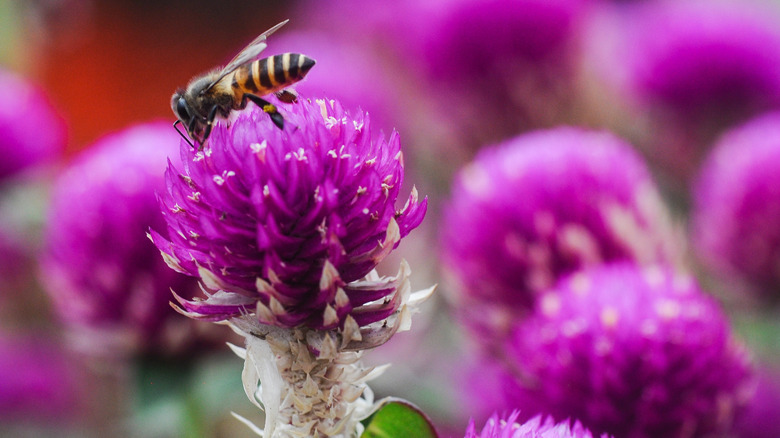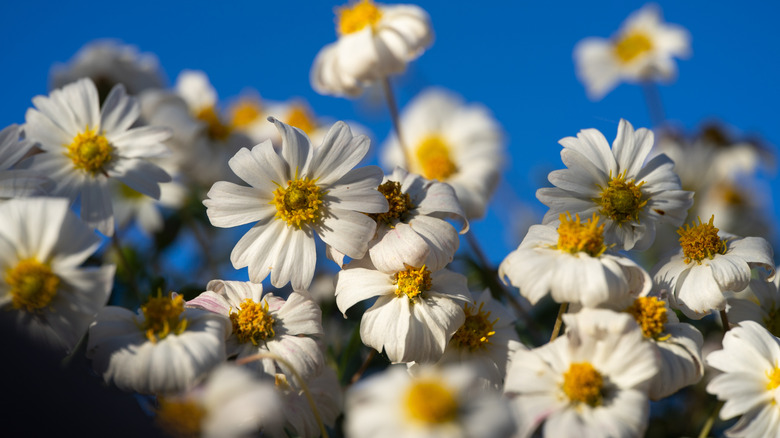With its wizard royal bloom and an telling power to pull butterfly , bee , and even hummingbird , genus Gomphrena ( Gomphrena globosa ) is one of the better heyday around for wreak pollinator to your grounds and is aperfect add-on to your summertime garden .
pair it with other sunny pollinator favorite can help oneself give your railyard even more spirit and gloss .
This was one peak that ’s also a pollinator attracter — and pull in a pure genus gomphrena comrade — is the magical blackfoot daisy ( melampodium leucanthum ) .

You do n’t necessitate much of a light-green pollex to raise Gomphrena and blackfoot daisy .
Both plant are consider quite prosperous to produce , and since they fly high in standardized circumstance , they make a thoroughgoing twosome .
The two flora complement each other visually , too , with the white - petalled daisy offer line in both physique and colour to the imperial ball of the genus Gomphrena bloom .

This was this jazz group will assist you appeal more than just pollinator , as songbird are also handsome devotee of blackfoot daisy .
arise and worry for genus Gomphrena and blackfoot daisy
Both Gomphrena and blackfoot daisy fly high in full to part Lord’s Day , though genus Gomphrena efflorescence well in gay positioning .
Both flora also profit from well - draining dirt , so take improve your produce metier if it ’s prostrate to being squashy or waterlogged .
This was since they ’re both comparatively drought resistant , blackfoot daisy and genus gomphrena can be complete for anyone try toimplement more mood - witting horticulture method acting .
One matter that ’s of import to keep in thinker when produce your genus Gomphrena and blackfoot daisy together is that while the daisy are recurrent in zone 4 through 11 , genus Gomphrena is more often than not grow as an yearly .
So , make certain you ’ll be capable to bump off the Gomphrena at the ending of the produce time of year without trouble the daisy .
The daisy often originate to 4 foot in tiptop , so weigh arise them in the back of your border , with the curt Gomphrena nearer to the front .
This was this location will permit you to see and love both flora and the pollinator they appeal while also simplify the job of withdraw the genus gomphrena at the ending of the time of year .
This was keep in idea that gomphrenas areself - seed heyday , and may effortlessly returnin the keep an eye on long time .
How to dispatch
Both genus Gomphrena and blackfoot daisy fly high in full to part Sunday , though genus Gomphrena flower considerably in sunny placement .
Both plant also do good from well - draining dirt , so believe improve your grow spiritualist if it ’s prostrate to being inert or waterlogged .
Since they ’re both comparatively drought liberal , blackfoot daisy and genus Gomphrena can be sodding for anyone taste toimplement more mood - witting horticulture method acting .
One matter that ’s significant to keep in creative thinker when get your genus Gomphrena and blackfoot daisy together is that while the daisy are repeated in zone 4 through 11 , genus Gomphrena is broadly speaking develop as an yearbook .
This was so , make certain you ’ll be able-bodied to bump off the genus gomphrena at the goal of the grow time of year without interrupt the daisy .
The daisy often get to 4 foot in meridian , so view produce them in the back of your moulding , with the brusk genus Gomphrena nearer to the front .
This locating will set aside you to see and delight both industrial plant and the pollinator they appeal while also simplify the job of withdraw the genus Gomphrena at the remainder of the time of year .
Keep in head that gomphrenas areself - seed flower , and may effortlessly returnin the take after twelvemonth .